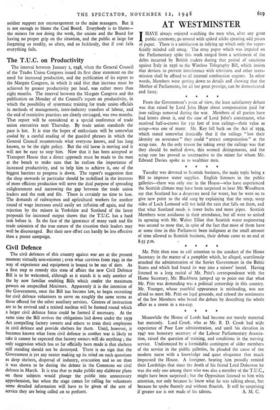AT WESTMINSTER
IHAVE always enjoyed watching the men who, after any great public ceremony, go around with spiked sticks spearing odd pieces of paper. There is a satisfaction in tidying up which only the super- ficially minded call smug. The stray paper which was impaled on the Parliamentary spike this week ranged from a settlement of the debts incurred by British traders during that period of sanctions against Italy in 1936 to the Wireless Telegraphy Bill, which insists that devices to prevent interference with television and other trans- mission shall be affixed to all internal combustion engines. In other words, Members were getting down to details and showing that the Mother of Parliaments, for all her great prestige, can be domesticated and fussy.
* * * * From the Government's point of view, the least satisfactory debate was that raised by Lord John Hope about compensation paid for iron railings removed during the war. Members of all parties have had letters about it, and the case of Lord John's constituent, who received half-a-crown for 13o feet of iron railings—their value as scrap—was one of many. Mr. Key fell back on the Act of 1939, which stated somewhat ironically that if the railings " lost their identity on severance " they could " attract compensation " at the scrap rate. As the only reason for taking away the railings was that they should be melted down, this seemed disingenuous, and the scrap rate has proved as unattractive to the miner for whom Mr. Edward Davies spoke as to wealthier men.
* * * * Tuesday was devoted to Scottish business, the main topic being a Bill to improve water supplies. English listeners in the public galleries—there was only one in the House—who have experienced the Scottish climate may have been surprised to hear Mr. Woodburn say that Scotland has a desperate need for water, but he went on to give new point to the old song by explaining that the steep, steep sides of Loch Lomond will not hold the rain that falls on them, and that what Scotland needs is fewer lochs and more pipes. Scottish Members were assiduous in their attendance, but all were so united in agreeing with Mr. Walter Elliot that Scottish water engineering was second to none that, in spite of the fact that most of them have at some time in this Parliament been indignant at the small amount of time allowed to Scottish business, their debate came to an end at 8.55 P-m- * * Mr. Pritt then rose to call attention to the conduct of the Home Secretary in the matter of a pamphlet which, he alleged, scurrilously attacked the administration of the Soviet Government in the Baltic States and which had found its way into a miners' hostel. Having listened to a long recital of Mr. Pritt's correspondence with the Home Secretary, Mr. Blackburn jumped up to point out that what Mr. Pritt was demanding was a political censorship in this country. Mr. Younger, whose youthful appearance is misleading, was not afraid to meet Mr. Pritt on legal grounds, and echoed the sentiments of the few Members who heard the debate by describing the whole affair as a storm in a tea-cup.
* * * * Meanwhile the House of Lords had become not merely maternal but matronly. Lord Crook, who as Mr. R. D. Crook had wide experience of Poor Law administration, and until his elevation in 1947 was honorary secretary of the Labour Parliamentary Associa- tion, raised the question of training, and conditions in the nursing service. Undismayed by a formidable contingent of older members of the service in the public galleries, he pleaded the cause of the modern nurse with a knowledge and quiet eloquence that much impressed the House. A foreigner. hearing him proudly remind their Lordships that since the death of his friend Lord Dukeston he was the only one among them who was also a member of the T.U.C., might have been surprised ; but the Opposition listened to him with attention, not only because he knew what he was talking about, but because he spoke fluently and without flourish. It will be surprising if greater use is not made of his talents. A. M. C.


































 Previous page
Previous page